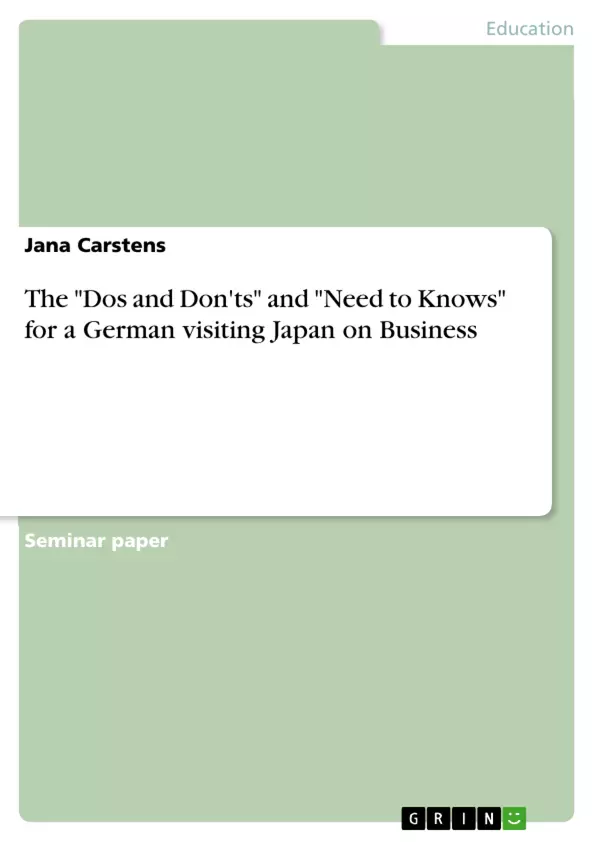[...] Etiquette is a minefield and a mistake can cost a businessman a contract. So it is important to
know about the business customs of a country you are doing business with. No one who
travels East with the intention to do business should do so without informing himself about
the business structure, practices, customs and habits. It is very common that business people
are sent from their company to exotic regions like Japan without being taught in cross-cultural
business or the country-specific customs and manners. The more exotic one country, the more
preparation is necessary.
In most Asian business cultures, harmony is valued above everything else.4 Problems can
arise out of the international cooperation and misunderstandings due to language and
gestures.5 When it comes to a faux pas, it can have serious consequences: the image of the
company can be destroyed, the contract will probably not be settled and the cooperation can
be deranged. Not the different manners, but the different mindsets make international
cooperation difficult: far-eastern distance hits the western backslapping mentality.6 “Building
relationships … should emphasize mutual trust, confidence, loyalty and commitment for the
long term, both among individuals and companies.”7 In this paper I will point out interesting facts and figures about Japan, its history, its capital as
well as its working conditions. Furthermore, I highlight strange Japanese customs and habits
and present special differences between Germany and Japan. For a German visiting Japan on
business, this information is essential to have. Although Europeans will never understand the
culture and tradition of the Japanese, they need to arrange with it in order to do business. I
will not mention facts about Japan’s economy and the consumers’ behaviour, which are also
important for doing business, because of the limited size of this paper.
4 Cf. Scheunemann, C., 4/2003, p. 18.
5 Cf. Obmann, C., 10/2003, p. 78.
6 Cf. Obmann, C., 10/2003, p. 78.
7 ACCJ, 1996, p. 19.
Table of Contents
- Introduction
- The postwar-history of Japan
- Need to knows
- Facts & Figures
- Tokyo
- Working conditions
- Differences between Japanese and Germans
- Dos and Don'ts
- Business customs
- Private habits
- Conclusion
Objectives and Key Themes
This paper aims to provide a comprehensive overview of essential aspects of Japan, focusing specifically on information crucial for German businesspeople visiting the country. It highlights key facts and figures, historical context, working conditions, and important cultural differences to help bridge potential misunderstandings.
- Understanding Japanese business customs and etiquette
- Navigating the cultural differences between Germany and Japan
- Recognizing the importance of building strong relationships in Japanese business culture
- Appreciating the historical context of modern Japan and its impact on current business practices
- Gaining insight into key aspects of Japanese society and working conditions.
Chapter Summaries
- Introduction: This chapter introduces the importance of understanding Japanese business culture and etiquette, emphasizing the potential for misunderstandings and the necessity of thorough preparation.
- The postwar-history of Japan: This chapter provides a concise overview of Japan's post-World War II history, highlighting key events that have shaped its current social and economic landscape. It covers the occupation by Allied Powers, the establishment of a new constitution, and the economic boom that followed the Korean War.
- Need to knows: This chapter delves into essential facts and figures about Japan, including information about its capital city, Tokyo, and its unique working conditions. It provides valuable insights for navigating the practical aspects of doing business in Japan.
- Differences between Japanese and Germans: This chapter explores key cultural differences between Japanese and German business practices, highlighting the importance of recognizing these differences to avoid potential misunderstandings and build successful relationships.
- Dos and Don'ts: This chapter provides practical advice on navigating Japanese business customs and etiquette, offering guidance on appropriate behavior in various business settings. It includes specific advice on common business practices and personal habits.
Keywords
This paper focuses on Japanese business culture, highlighting the key differences between German and Japanese business practices, and providing practical advice for Germans visiting Japan on business. Key concepts include: business customs, etiquette, cultural differences, post-war history, working conditions, and building relationships.
Frequently Asked Questions
Why is etiquette so important in Japanese business?
In Japan, harmony is highly valued. A cultural faux pas can destroy a company's image, lead to failed contracts, and damage long-term cooperation.
What is the focus of Japanese business relationships?
Relationships in Japan emphasize mutual trust, confidence, loyalty, and a strong commitment to the long term between individuals and companies.
What are the "Need to Knows" for Tokyo?
The paper provides essential facts about Japan's capital, including working conditions and general social figures necessary for any visiting businessman.
How do Japanese and German mindsets differ?
A key difference is the "Far-Eastern distance" versus the "Western backslapping mentality," which can lead to misunderstandings if not properly managed.
What are some "Dos and Don'ts" in Japan?
The paper highlights specific business customs and private habits, such as proper bowing, gift-giving etiquette, and communication styles to avoid offense.
- Citar trabajo
- Jana Carstens (Autor), 2004, The "Dos and Don'ts" and "Need to Knows" for a German visiting Japan on Business, Múnich, GRIN Verlag, https://www.grin.com/document/29866



